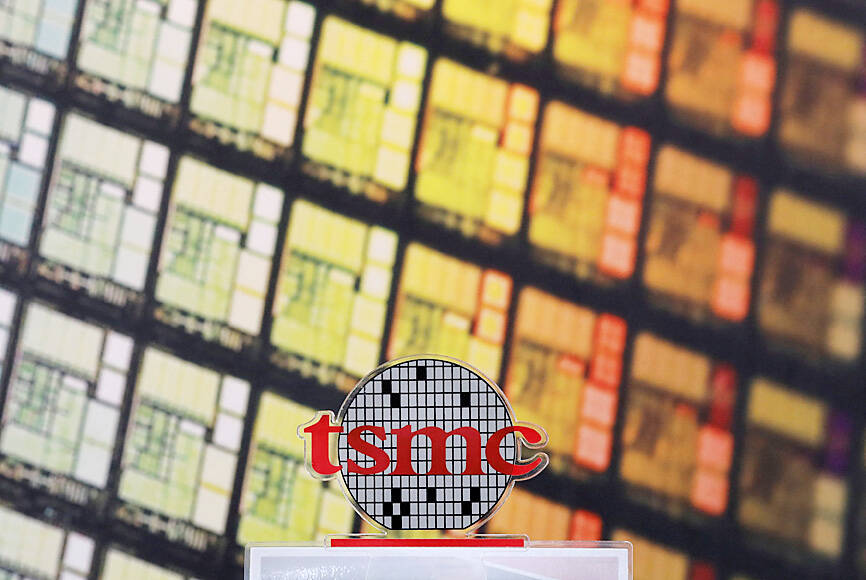Taiwan Semiconductor Manufacturing Co (TSMC, 台積電 ) yesterday said it is postponing the construction of a new fab in Kaohsiung for the production of 7-nanometer (nm) chips in response to weak demand, but the world’s biggest contract chipmaker reiterated its commitment to continue investing in advanced technology in Taiwan.
TSMC chief executive officer C.C. Wei (魏哲家) made the announcement at an Industrial Technology Research Institute (工研院) event in Hsinchu yesterday, after recent speculation about the company’s capacity expansion plan in Kaohsiung.
Last month, Wei told investors that TSMC had initially planned to build two factories to make 7-nanometer and 28-nanometer wafers in the new Nanzih Technology Industrial Park in Kaohsiung.

Photo: Tyrone Siu, REUTERS
With the semiconductor industry entering an inventory correction cycle, TSMC has “adjusted” the fab for the 7-nanometer factory due to weak demand for chips used in smartphones and computers, Wei said.
In the fourth quarter of this year, the capacity utilization of 7-nanometer and 6-nanometer chips would not be as high as it had been in the past three years, he said.
However, the plan to build the 28-nanometer fab would proceed on schedule and could even be expanded, he said.
The chipmaker has yet to break ground on either project. A groundbreaking ceremony for the park was held in August. The park is on a site where state-owned oil company CPC Corp, Taiwan (中油), used to operate a naphtha cracker.
To build a resilient supply chain, TSMC is building capacity in the US and Japan. The Wall Street Journal reported on Thursday that TSMC aimed to build a second chipmaking plant in Arizona.
TSMC said it is evaluating the possibility of the expansion plan, but nothing is substantial yet.

South Korea’s equity benchmark yesterday crossed a new milestone just a month after surpassing the once-unthinkable 5,000 mark as surging global memory demand powers the country’s biggest chipmakers. The KOSPI advanced as much as 2.6 percent to a record 6,123, with Samsung Electronics Co and SK Hynix Inc each gaining more than 2 percent. With the benchmark now up 45 percent this year, South Korea’s stock market capitalization has also moved past France’s, following last month’s overtaking of Germany’s. Long overlooked by foreign funds, despite being undervalued, South Korean stocks have now emerged as clear winners in the global market. The so-called “artificial intelligence

NEW IDENTITY: Known for its software, India has expanded into hardware, with its semiconductor industry growing from US$38bn in 2023 to US$45bn to US$50bn India on Saturday inaugurated its first semiconductor assembly and test facility, a milestone in the government’s push to reduce dependence on foreign chipmakers and stake a claim in a sector dominated by China. Indian Prime Minister Narendra Modi opened US firm Micron Technology Inc’s semiconductor assembly, test and packaging unit in his home state of Gujarat, hailing the “dawn of a new era” for India’s technology ambitions. “When young Indians look back in the future, they will see this decade as the turning point in our tech future,” Modi told the event, which was broadcast on his YouTube channel. The plant would convert

‘SEISMIC SHIFT’: The researcher forecast there would be about 1.1 billion mobile shipments this year, down from 1.26 billion the prior year and erasing years of gains The global smartphone market is expected to contract 12.9 percent this year due to the unprecedented memorychip shortage, marking “a crisis like no other,” researcher International Data Corp (IDC) said. The new forecast, a dramatic revision down from earlier estimates, gives the latest accounting of the ongoing memory crunch that is affecting every corner of the electronics industry. The demand for advanced memory to power artificial intelligence (AI) tasks has drained global supply until well into next year and jeopardizes the business model of many smartphone makers. IDC forecast about 1.1 billion mobile shipments this year, down from 1.26 billion the prior

People stand in a Pokemon store in Tokyo on Thursday. One of the world highest-grossing franchises is celebrated its 30th anniversary yesterday.